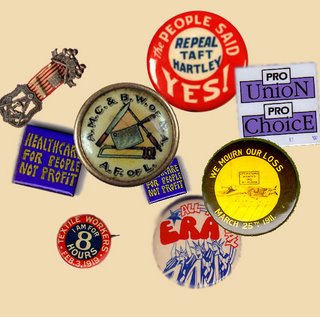Most of us don’t have a basic knowledge of labor history, much less the plight of illegal immigrant laborers in Twenty-first Century America
Part I

First, An Extremely Abbreviated History of Labor Unions
Local unions of craftsmen existed in the colonies in 18th Century America. In fact, the Declaration of Independence was signed in Carpenter’s Hall in Philadelphia in 1776. Early in the 19th Century larger, but for the most part, unsuccessful local unions organized in the attempt to protect workers from unscrupulous employers as the factory system industrialized America. Unions had become necessary because the typical workday was twelve hours or longer and wages sometimes lower than a dollar a week. Later during the Nineteenth Century, larger unions such as the Nation Labor Union (1866) were organized. That short lived union collapsed during the economic depression of 1873. However, The Knights of Labor were organized in 1869, and Samuel Gompers organized the American Federation of Labor in 1886.
A myopic look at organized mine workers can be generalized to the need for unions in all areas of industry. The United Mine Workers union was organized in 1890, and was the result of the merger of The Knights of Labor with the National Progressive Union of Minors. A short list of clashes with corporate and / or local, state, and Federal government forces demonstrates that labor union protection for minors was necessary into the third quarter of the 20th Century.
1. Nineteen minors killed by police in Lattimer Massacre, Lattimer, Pennsylvania, September 10, 1897.
2. Twenty people, including women and children, killed in Ludlow, Colorado on April 20, 1914 by state militia, and thugs hired by the Colorado Fuel and Iron Company.
3. 12 men killed in a battle between residents of Matewan, Virginia and the Felts Detective agency, hired by coal mine owners on May 19, 1920.
4. An outgrowth of the Matewan incident, The Redneck War (1920-21) started when 10,000 miners marched on Logan, Virginia. It ended with the battle of Bear Mountain between the miners and state militia, police, and mine guards.
5. The Harlan County War of 1973 when Duke Power owned, Eastover Coal Company workers in Harlan County, Kentucky voted to join the United Mine Workers Union. The company refused to sign the new contract, a strike followed in which (scabs) workers from outside the company were brought in to replace the unionized workers. The local courts sided with the corporation and during the last months of the strike women and children on the picket line were run over by cars, beaten and hit with baseball bats, and arrested.
The deaths of trapped coal minors this past year (2005-2006) demonstrate that working conditions in mines are unsafe to this day, and that unions are necessary to protect workers from corporate entities that serve only commercial and financial interests.
For more on the “History of Labor Unions,” go to The National Learning Curve The United Kingdom education Website.
Stay tuned for “part II” to come in the near future.
Sources
Wikkepedia. “United Mine Workers,” http://en.wikipedia.org/wiki/United_Mine_Workers. Modified 23:48, 15 March 2006. Viewed 10:48 EST, Tuesday, March 28, 2006.
The Social Studies Help Center. “The Labor Union Movement in America,” http://www.socialstudieshelp.com/Eco_Unionization.htm. © 2001-2006. Viewed 10:51 EST, Tuesday, March 28, 2006.
The National Learning Curve. “Trade Unions,” http://www.spartacus.schoolnet.co.uk/USAtu.htm. Viewed 9:44 AM EDT, Tuesday, April 4, 2006.
Labor Arts. “About Us,” http://www.laborarts.org/about/. ©, Labor Arts Inc. Viewed 10:13 AM EST, Friday March 31, 2006.
Montgomery County Public Schools (Montgomery, Maryland). “Social Studies: An Apprenticeship in Liberty.” http://mcps.k12.md.us/curriculum/socialstd/curriculum/ushist.html. © 2003. Viewed 10:18 AM, Friday, March 31, 2006.
Public Schools of North Carolina, Standard Courses of Study, Social Studies :: 2003:: Eleventh Grade Social Studies. http://www.ncpublicschools.org/curriculum/socialstudies/scos/2003-04/067eleventhgrade. No copyright. Viewed 10:30 AM EST, Friday, March 31, 2006.







